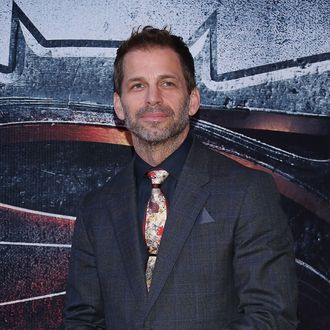
Hoo boy. Just in time for the digital release of Zack Snyder’s version of Justice League, Rolling Stone has renewed a fresh round of Snyder Cut discourse. There are plenty of claims in the lengthy new report — for example, the director is accused of refusing to return hard drives to make his alternate cut, requesting millions in production costs after shooting unauthorized new scenes in his backyard, and threatening to delete existing footage if he wasn’t allowed to keep a character arc that hadn’t been in the original script. (He denied doing any of those things.) Yet the bulk of the July 18 report actually focuses on claims related to social media. Reportedly, WarnerMedia commissioned two investigations into the ultimately successful online campaign to release the Snyder Cut and found that at least 13 percent of the accounts involved were fake. For reference, cyber experts told the outlet the typical figures for fake accounts talking about a trending topic range from 3 to 5 percent, while Twitter has estimated that “false or spam” accounts make up less than 5 percent of daily active users (ya hear that, Elon?). A firm that identifies misinformation and social-media manipulation found that forsnydercut.com, an instrumental hub whose creator helped spread the viral hashtag #ReleasetheSnyderCut, was once registered to the CEO of a now-defunct ad agency that promised to bring “cheap, instant Avatar traffic to your website.”
Multiple unnamed insiders involved on the original and recut version of Justice League accused Snyder of helping manipulate the social-media movement calling for the release of his Snyder Cut. Allegedly, Snyder has experience with inorganic fan engagement, with one source accusing the director of hiring a digital-marketing firm to counteract critical reception of his 2016 film, Batman v Superman: Dawn of Justice. Snyder, of course, denied any manipulation. In fact, he claimed that “if anyone” was pulling social-media strings, it was Warner Bros., “trying to leverage my fan base to bolster subscribers to their new streaming service.”
The director is said to have been upset with Justice League producers Geoff Johns and Jon Berg for “dragging their feet” on removing themselves from the credits for the Snyder Cut. Allegedly, Snyder’s agent called the studio daily to check in about the producers. Snyder admitted that he and his wife, Deborah, who was also a Justice League producer, made personal pleas to Warner. When that didn’t work, Rolling Stone’s sources claim that Snyder threatened to “destroy” Johns and Berg on social media. Like others who fans felt were standing in the way of Snyder’s vision, the two producers were the target of massive backlash online.
Snyder previously rejected claims that his fan base is toxic by pointing to the hundreds of thousands of dollars it has raised for suicide prevention. Yet according to Rolling Stone, digital vitriol around Snyder’s perceived opponents was such that Warner Bros.’ security division was brought in. Even other movies were affected: Director Adam Wingard reportedly once asked Snyder through an intermediary to tell Snyderverse supporters to stop review-bombing his film Godzilla vs. King, which angered some fans because it launched on HBO Max shortly after the Snyder Cut. Snyder allegedly refused, though he told Rolling Stone he was never asked to tell his fans to stand down. “Furthermore, I do not control my fans,” he added. “They have their own will and their own opinions; you really give me too much credit.”


